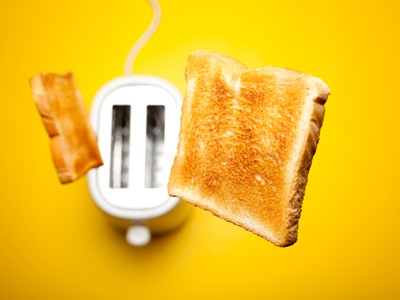
Ask the AI Tutor
Need help with Energy? Ask our AI Tutor!
AI Tutor - Lucy
Connecting with Tutor...
Please wait while we establish connection

In order to work, a toaster needs electrical energy.
Energy
Energy is vital for life. In KS3 Science, you’ll learn how food transforms into energy that powers movement, growth, and every process inside your body.
1 .
Which of these is not a form of energy?
Kinetic (motion)
Thermal (heat)
Chemical
Power
'Power' is often used as another word for 'energy', but it is not a form of energy. Other forms of energy include: radiant (light), electrical, nuclear and gravitational potential energy
2 .
Which of these is not an example of potential energy?
A car at the top of a hill
A beam of light from a torch
A stretched rubber band
A diver on the edge of a diving board
A beam of light is radiant (light) energy
3 .
Which of these is not an example of kinetic energy?
A moving bicycle
The second hand of a clock moving
Someone rowing a boat
Wood stored in a woodpile
Wood is an example of stored, or potential, energy
4 .
What do we call fuel sources such as coal, oil and natural gas?
Non-renewable energy sources
Renewable energy sources
Nuclear energy
Radiant energy
Coal, oil and natural gas are all 'fossil fuels' that took millions of years to form under the ground. Because they cannot be easily replaced, they are called 'non-renewable' energy sources
5 .
What happens to the energy you store in your body?
It disappears
It is used up
It changes into other forms of energy
It is lost
Energy cannot be created or destroyed, but it can change into other forms - this is called the 'Law of Conservation of Energy' - did you know that most of your body's energy is converted to heat?
6 .
In order to work, a toaster needs what?
Electrical energy
Chemical energy
Kinetic energy
None of the above
A toaster uses electrical energy, which it converts to heat and light - you use kinetic energy when you put the bread in the toaster and press the lever
7 .
Stored energy is called what?
Electrical energy
Potential energy
Kinetic energy
Saved energy
'Potential' means 'possible'. Potential energy can become another form of energy, such as kinetic. A stretched spring would contain potential energy
8 .
Children skipping rope are converting stored energy (from the food they've eaten) into which form of energy?
Potential energy
Light energy
Kinetic energy
Nuclear energy
Kinetic means 'movement'
9 .
Energy is measured in what?
Degrees Celsius
Metres
Grams
Joules
Degrees Celsius measure temperature, metres measure distance and grams measure mass or weight
10 .
What do we call electrical energy which comes from sources such as the Sun, the wind or waves?
Non-renewable energy
Renewable energy
Nuclear energy
All of the above
The wind, the waves and the Sun will not run out for billions of years and so they are renewable
**Unlimited Quizzes Await You! 🚀**
Hey there, quiz champ! 🌟 You've already tackled today's free questions.
Ready for more?
Ready for more?
🔓 Unlock UNLIMITED Quizzes and challenge yourself every day. But that's
not all...
not all...
🔥 As a Subscriber you can join our thrilling "Daily Streak" against other
quizzers. Try to win a coveted spot on our Hall of Fame Page.
quizzers. Try to win a coveted spot on our Hall of Fame Page.
Don't miss out! Join us now and keep the fun rolling. 🎉
**Unlimited Quizzes Await You! 🚀**
Hey there, quiz champ! 🌟 You've already tackled today's free questions. Ready for more?
🔓 Unlock UNLIMITED Quizzes and challenge yourself every day. But that's not all...
🔥 As a Subscriber you can join our thrilling "Daily Streak" against other quizzers. Try to win a coveted spot on our Hall of Fame Page.
Don't miss out! Join us now and keep the fun rolling. 🎉






